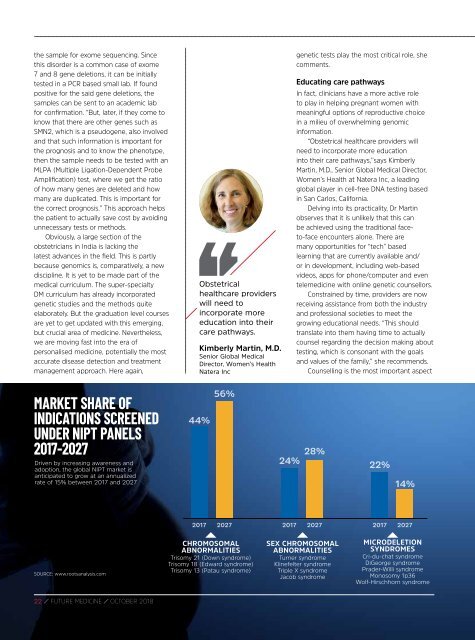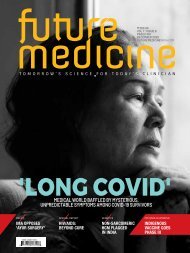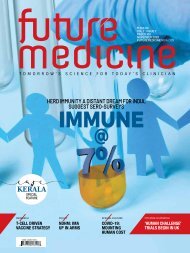You also want an ePaper? Increase the reach of your titles
YUMPU automatically turns print PDFs into web optimized ePapers that Google loves.
the sample for exome sequencing. Since<br />
this disorder is a common case of exome<br />
7 and 8 gene deletions, it can be initially<br />
tested in a PCR based small lab. If found<br />
positive for the said gene deletions, the<br />
samples can be sent to an academic lab<br />
for confirmation. “But, later, if they come to<br />
know that there are other genes such as<br />
SMN2, which is a pseudogene, also involved<br />
and that such information is important for<br />
the prognosis and to know the phenotype,<br />
then the sample needs to be tested with an<br />
MLPA (Multiple Ligation-Dependent Probe<br />
Amplification) test, where we get the ratio<br />
of how many genes are deleted and how<br />
many are duplicated. This is important for<br />
the correct prognosis.” This approach helps<br />
the patient to actually save cost by avoiding<br />
unnecessary tests or methods.<br />
Obviously, a large section of the<br />
obstetricians in India is lacking the<br />
latest advances in the field. This is partly<br />
because genomics is, comparatively, a new<br />
discipline. It is yet to be made part of the<br />
medical curriculum. The super-specialty<br />
DM curriculum has already incorporated<br />
genetic studies and the methods quite<br />
elaborately. But the graduation level courses<br />
are yet to get updated with this emerging,<br />
but crucial area of medicine. Nevertheless,<br />
we are moving fast into the era of<br />
personalised medicine, potentially the most<br />
accurate disease detection and treatment<br />
management approach. Here again,<br />
Obstetrical<br />
healthcare providers<br />
will need to<br />
incorporate more<br />
education into their<br />
care pathways.<br />
Kimberly Martin, M.D.<br />
Senior Global Medical<br />
Director, Women’s Health<br />
Natera Inc<br />
genetic tests play the most critical role, she<br />
comments.<br />
Educating care pathways<br />
In fact, clinicians have a more active role<br />
to play in helping pregnant women with<br />
meaningful options of reproductive choice<br />
in a milieu of overwhelming genomic<br />
information.<br />
“Obstetrical healthcare providers will<br />
need to incorporate more education<br />
into their care pathways,’’says Kimberly<br />
Martin, M.D., Senior Global Medical Director,<br />
Women’s Health at Natera Inc, a leading<br />
global player in cell-free DNA testing based<br />
in San Carlos, California.<br />
Delving into its practicality, Dr Martin<br />
observes that it is unlikely that this can<br />
be achieved using the traditional faceto-face<br />
encounters alone. There are<br />
many opportunities for “tech” based<br />
learning that are currently available and/<br />
or in development, including web-based<br />
videos, apps for phone/computer and even<br />
telemedicine with online genetic counsellors.<br />
Constrained by time, providers are now<br />
receiving assistance from both the industry<br />
and professional societies to meet the<br />
growing educational needs. “This should<br />
translate into them having time to actually<br />
counsel regarding the decision making about<br />
testing, which is consonant with the goals<br />
and values of the family,’’ she recommends.<br />
Counselling is the most important aspect<br />
MARKET SHARE OF<br />
INDICATIONS SCREENED<br />
UNDER NIPT PANELS<br />
2017-2027<br />
Driven by increasing awareness and<br />
adoption, the global NIPT market is<br />
anticipated to grow at an annualized<br />
rate of 15% between 2017 and 2027<br />
44%<br />
56%<br />
24%<br />
28%<br />
22%<br />
14%<br />
2017 2027 2017 2027 2017 2027<br />
SOURCE: www.rootsanalysis.com<br />
CHROMOSOMAL<br />
ABNORMALITIES<br />
Trisomy 21 (Down syndrome)<br />
Trisomy 18 (Edward syndrome)<br />
Trisomy 13 (Patau syndrome)<br />
SEX CHROMOSOMAL<br />
ABNORMALITIES<br />
Turner syndrome<br />
Klinefelter syndrome<br />
Triple X syndrome<br />
Jacob syndrome<br />
MICRODELETION<br />
SYNDROMES<br />
Cri-du-chat syndrome<br />
DiGeorge syndrome<br />
Prader-Willi syndrome<br />
Monosomy 1p36<br />
Wolf-Hirschhorn syndrome<br />
22 / FUTURE MEDICINE / <strong>OCTOBER</strong> <strong>2018</strong>


















